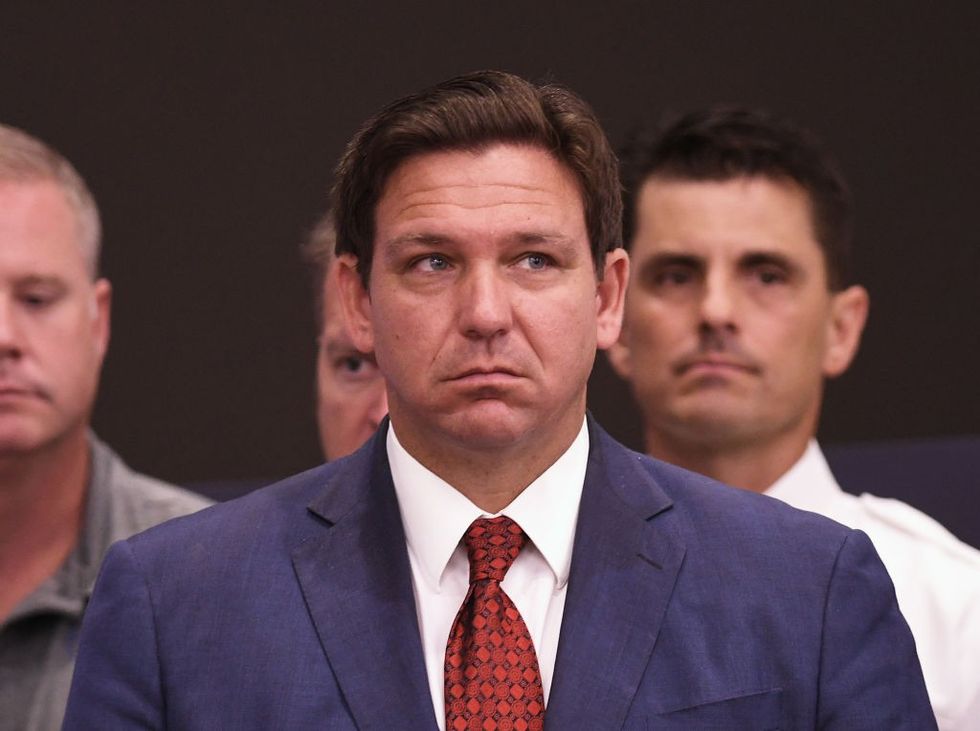
Florida Governor Ron DeSantis is angling to be Trump 2.0, fortified with virility and discipline. He is widely expected to enter the race to be the 2024 Republican nominee for president, and he is paving that path with an aggressive campaign against “woke” education.
Like Trump, DeSantis represents aggrieved manhood, the growing conviction that masculinity is under attack and must be restored to set society right. I say this not as a professor on defense, but as a white woman born of evangelical populism and reared on manly grievance, who learned it firsthand and by heart. Aggrieved manhood is reactive: the gnawing feeling that “real men”—especially the straight white Western Christian kind—have been getting a bad rap and shouldn’t take it anymore.
DeSantis is one node in this booming backlash, which reframes any awareness of “toxic masculinity” and “white male privilege” as itself victimizing white men. Sociologist Michael
Kimmel called this clever reversal “aggrieved entitlement.” DeSantis is betting his political fortune on it.
Unlike Trump, DeSantis resists caricature. He radiates the vitality Trump lacks, and the self-restraint too. He’s honing his strategy to “save our schools” with the help of Chris Rufo, chief
architect of two recent panics, over “critical race theory” and “groomers” (code for teachers who support LGBTQ students). Now, DeSantis has Rufo heading a higher-ed experiment at the New College of Florida, where they’re perfecting the art of rebranding diversity, equity, and inclusion initiatives (“DEI” for short) as a threat to national security.
Branding is the operative word. By his own admission, Rufo cares less about ideology. His goal is to stoke fast sensation, the sort that clenches the fist and lashes out at school boards, bypassing deliberation. Rufo is refining the GOP culture wars to feed on ‘sense bites’ of entitled outrage rather than ideas. CRT, groomers, DEI… One trigger after another leaves us salivating for the next excuse to feast.
Unbeknown to most, the manosphere is the international engine of the far right. Worldwide, right-wing populists and far-right extremists adhere to the manosphere’s culture-war playbook and count on its unique capacity to super-spread outrage.
How did Rufo and DeSantis—or Bannon and Trump before them—come into this potent strategy? By harnessing the power of a massive yet overlooked online phenomenon known as the “manosphere.” With the rise of participatory platforms over the last decade, the manosphere has exploded into a vast and thriving global economy peddling aggrieved manhood in all its varieties: misogyny, homophobia, racism, anti-Semitism, white supremacy, and more. The manosphere serves up one basic sentiment—rightful virility, wrongly denied—in heady local brews that range from “decaf” anti-feminist irony to full-strength virulent violence. DeSantis’ plan for education is only one of the potions on offer.
Unbeknown to most, the manosphere is the international engine of the far right. Worldwide, right-wing populists and far-right extremists adhere to the manosphere’s culture-war playbook and count on its unique capacity to super-spread outrage. Politicians (think: Trump, Bolsonaro, Orbán), pundits (Tucker Carlson), and strategists at the highest levels (Bannon, Rufo) do so purposefully, tactically, and blatantly. And yet—save the odd occasion when bit players like Andrew Tate hit the news—the manosphere hides in plain sight.
Aggrieved manhood is everywhere these days, a throughline linking many confounding recent events: COVID anti-masking and lockdown protests, insurrections (now plural), climate denial, election denial, mass shootings and other supremacy crimes, and the spate of recent anti-trans bills and other “parental rights” scares. So why have so many pundits and commentators failed to recognize it for what it is?
To contend with Trump 2.0, our vocabulary needs a booster shot.
For one thing, anyone can feel manly grievance or take up its mantle (as the Marjorie Taylor Greenes of the world keep reminding us). Hence the misnomer “populism.” But something crucial is missed when (for example) Thomas Edsall’s detailed NYT
op-ed about the psychopathy of today’s far-right populists makes no discernable mention of masculinity as a factor. Omitting aggrieved manhood means overlooking the clear thread that binds all these apparently “personal” and “individual” traits together. Can we start to call aggrieved manhood by its name?
If for no other reason, here’s why we should. Manly grievance is now in the water, so to speak. Thanks to the manosphere, this sentiment regularly
reaches young men and boys, tainting their early encounters with the world. We may never know why a 6-year-old boy in Virginia recently pulled the trigger on his teacher, but we do know that school shooters—of all ages—almost always show signs of aggrieved manhood. Alongside calls for gun safety and mental-health resources, we need to flatten the curve of this feeling.
If DeSantis gets his way, aggrieved manhood will rule the school instead, heightening children’s exposure to a passionate fury they can absorb and act out without ever comprehending the politics entailed. People of all politics have a stake in stopping that.
To contend with Trump 2.0, our vocabulary needs a booster shot. Aggrieved manhood has already proven itself an infectious strain of
viral—not just toxic—masculinity, and DeSantis aims to accelerate its spread.




